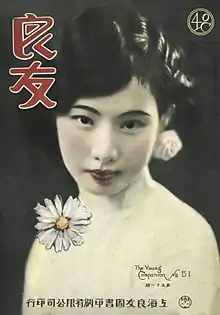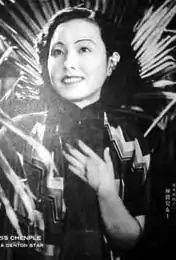Chen Bo'er
Chen Bo'er (Chinese: 陈波儿; pinyin: Chén Bō'ér; 1907–1951) was a Chinese actress, director, screenwriter, novelist, animator, educator and revolutionist who advocated the establishment of the People's Republic of China's first national film school.[1] During her lifetime she appeared in several films and had a starring role in China's first sound motion picture Plunder of Peach and Plum,[2] and she is considered one of the pioneers of the Socialist feminism.[3]
Chen Bo'er | |||||||||||
|---|---|---|---|---|---|---|---|---|---|---|---|
 Chen on the cover of Liangyou Magazine, 1930 | |||||||||||
| Born | Chen Shunhua July 15, 1907 | ||||||||||
| Died | November 10, 1951 (aged 44) | ||||||||||
| Occupation | Actress | ||||||||||
| Spouse(s) | Yuan Muzhi | ||||||||||
| Chinese name | |||||||||||
| Simplified Chinese | 陈波儿 | ||||||||||
| |||||||||||
Early life

Chen, née Chen Shunhua (Chinese: 陈舜华), was born in 1907 in Anbu, Chaozhou, Guangdong Province. She graduated from Shanghai Art University in 1929 and married classmate Ren Bosheng in 1931. Though settled in Hong Kong, Chen moved back to Shanghai where she appeared in a number of anti-Japanese productions including a 1937 dramatization of the Defense of Sihang Warehouse (八百壯士) and the Marco Polo Bridge Incident (保卫蘆溝橋). After joining the Chinese Communist Party she traveled with her son to Yan'an to direct films with strong female leads that promoted Maoist principles in order to recruit woman to the party.[1]
In 1947, she married fellow actor Yuan Muzhi before moving back to Shanghai a year later to establish a predecessor of the Beijing Film Academy.[1]
Film career
Chen appeared in several films over her career as an actress. She held a starring role as Li in 1934 sound film, Plunder of Peach and Plum (known also as The Fate of the Graduates), one of China's earliest talking movies. In 1936, she starred alongside real-life husband and fellow political activist Yuan Muzhi in Unchanged Heart in Life and Death. She held a role in 800 Heroes in 1938 as a girl scout.[4] Chen's directorial debut was Working Hero in the Communist Base (1946).
In 1947, Chen was sent to oversee productions at North East Film Studio. Here, she wrote screenplays and created puppet animations which painted Kuomintang leader Chiang Kai-shek as a stooge propping up American Imperialism. Chen who saw a continued future for animation decided to establish a permanent animation studio within the department and put animator Te Wei in charge.
References
- Lent, Xu, John A, Ying (2017). Comics Art in China. University Press of Mississippi. p. 161. ISBN 9781496811776.
- "陈波儿". hqcr.com (in Chinese). Retrieved 7 November 2017.
- Wang, Zheng (2017). Finding Women in the State: A Socialist Feminist Revolution in the People's Republic of China, 1949-1964. Univ of California Press. pp. 143–169. ISBN 978-0-520-29229-1.
- "Ba bai zhuang shi". IMDb.